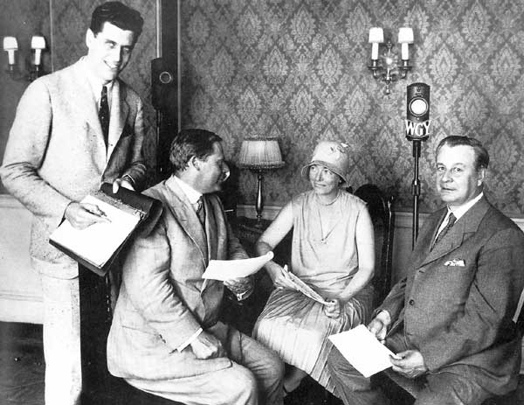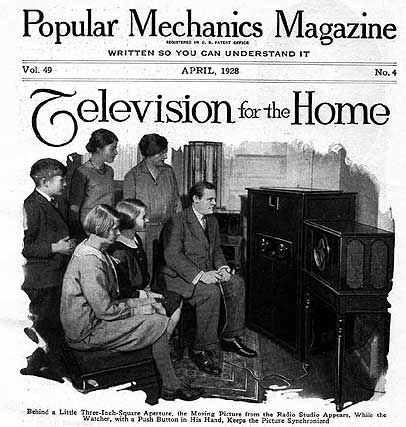The world's first television drama

The cast of the world's first television drama, on set in Schenectady.
Here's a little something to think about while you're watching Mad Men on one of the hundreds of channels on your HDTV: The very first television drama was filmed in Schenectady in 1928.
It was a little play called The Queen's Messenger, a British drama with more special effects technicians than there were television sets in the Capital Region.
More on how it was filmed, plus a neat clip that shows how it worked, after the jump.
The September 1928 broadcast took place just a few months after the first televised newscast, on W2XAD -- the signal owned by General Electric's WGY (today it's WRGB). The actors weren't that famous, but the director, Mortimer Stewart, was a pretty well-known radio director from New York City at the time.
The play itself was a melodrama by Irish playwright J. Hartley Manners. The station's founder remembered it as "a little drama, a playlet, that was not a great work of art by any means." But how it was done, and what it would lead to, was much more interesting.
Three still cameras were used to film the program. Two cameras shot the faces of the actors. The third was used to show props and other images. For close-ups on hands, they used the hands of two "assistant actors" in front of the third camera.
The clip below looks like it's from a rehearsal:
An article in the New York Herald Tribune explained how the shoot worked:
Director Mortimer Stewart stood between the two television cameras that focused upon Miss Isetta Jewell, the heroine and Maurice Randall, the hero. In front of Stewart was a television receiver in which he could at all times see the images that went out over the transmitter; and by means of a small control box he was able to control the output of pictures, cutting in one or another of the cameras and fading the image out and in. (via CBS6)Of course, no matter how fancy their technique, there's only so much the handful of viewers would see. Televisions in 1928 had small, pink, 3 inch by 3 inch screens.

So how were the reviews?
The Washington Post reported that the voices were strong but the images faded in and out. And as for radio with pictures, The New York Herald Tribune said:
"Whether the present system can be brought to commercial practicability and public usefulness, remains a question." (via earlytelevision.org)
But the New York Times predicted that "Great as has been the success of the talking movies, they may easily be outdone by radio-television if the technical difficulties are overcome."
photo via earlytelevision.org
Say Something!
We'd really like you to take part in the conversation here at All Over Albany. But we do have a few rules here. Don't worry, they're easy. The first: be kind. The second: treat everyone else with the same respect you'd like to see in return. Cool? Great, post away. Comments are moderated so it might take a little while for your comment to show up. Thanks for being patient.
Comments
While a good deal of the early technological history of television was clouded by a tremendous PR campaign by RCA and "General" Sarnoff, there is no question that Schenectady played a significant role in the development of actual programming for the little curiosity (as it had with commercial radio just years before). This is a very cool reminder.
... said Carl on Oct 27, 2010 at 3:56 PM | link
WOW! You have a goldmine of interesting history right at your fingertips!...That would be a wonderful little blurb to show every so often, especially if you have more of archival material. Love it
... said maureen geracitano on Oct 28, 2010 at 10:18 AM | link
I am a TV historian, writing for The Antique Wireless Association. I am researching the production of the 1928 show and have not been able to find technical information on the cameras and equipment used on the broadcast.
Can you help?
... said Richard Brewster on Nov 1, 2013 at 12:19 PM | link
Richard -- try reaching out to these folks. They may be able to help. http://edisontechcenter.org
The Schenectady Museum (now MiSci) may also be able to help:
http://www.schenectadymuseum.org/archives/archives.html
... said Carl on Nov 1, 2013 at 6:19 PM | link